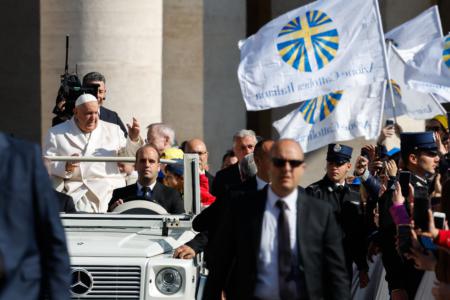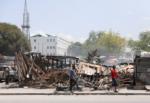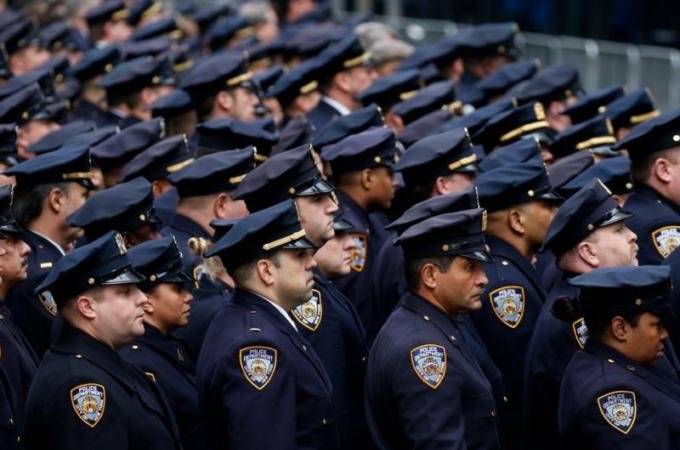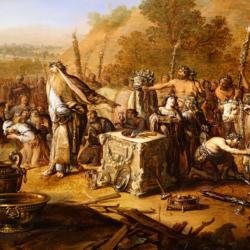Panelists: With police abolition come added corrective societal measures
WASHINGTON (CNS) -- The calls to "abolish the police" did not begin with the May 25 killing of George Floyd in Minneapolis. Instead, they simply picked up steam.
Yet other corrective measures are needed within society that go hand in hand with abolishing police, said panelists during a June 24 forum, "Police Abolition: What Does It Mean?" It is sponsored by Georgetown University Law School.
Georgetown law professor Christy Lopez, who moderated the panel, cited an Associated Press poll showing an "astounding" 95% of respondents saying some kind of policing reform is needed, "quite a sea change from just five years ago."
The "criminalization of addiction and poverty," Lopez added, "has not brought us the peace and safety we want." Police abolition "has its roots in mostly Black, mostly feminist thinking," she said, and this thinking has developed strategies to deal with murder, sexual violence and mental health crises.
Tahir Duckett, a civil rights and racial justice litigation lawyer for a Washington law firm, has been writing a book on police abolition. The concept of police abolition "starts with the recognition that police and prisons have failed to do what they claim to do" and instead inflict "immeasurable harm to people and communities, in particular Black people and communities," he said, and can be linked to the fight to abolish slavery.
Duckett took note of "the solidarity with officers who have committed horrific acts of violence," citing the 57 police officers who resigned from a specialized unit in Buffalo, New York, after two of their members were charged in the shoving of a 75-year-old protester -- "that man is still in the hospital, by the way," he said -- and Atlanta, where an officer was charged with murder and other offenses in the June 12 shooting death Rayshard Brooks, "of reports of work slowdowns and 'blue flu.'"
"I don't know how we save an institution that appears to be so far gone," Duckett said. "I don't know if it's worth saving."
In Georgia, the Atlanta Police Union has stated that some police have not reported for duty because they feel there has been no due process for their fellow officers charged in Brooks' death and that the investigation has "not been done properly." There are calls for the attorney general, who brought the charges, to appoint a special prosecutor.
Justin Hansford, who teaches law at Howard University Law School in Washington and is director of the Thurgood Marshall Civil Rights Center, also represented Michael Brown's family after the 18-year-old's killing by a police officer in Ferguson, Missouri, accompanying them to Geneva to deliver the "Ferguson to Geneva" human rights "shadow report" to a United Nations torture panel in 2014.
Hanford argued for the creation of "a fund for victims of violence by police, that mental health services can be provided for families If the person was killed was the primary breadwinner for those families. It's the case that it just looks like reparations for the families rather than retributive justice."
Hanford said, "It's a very generous argument. It's a very benevolent argument. It's not from the crazy left or from radicals." Those making this argument "have done some spiritual work that allows them to move past revenge," he said. "When you talk about race as a principle, people around the country or around the world should be very happy to hear that Black people are not about revenge. We think that justice goes beyond revenge."
Georgetown law professor Allegra McLeod, who prior to teaching was a criminal defense and immigration lawyer, said abolition "is as much a positive project as it is a negative project. Abolition is about eliminating racialized violence in the criminal justice system."
Reform efforts that "fail to grasp the radical demand for abolition," McLeod said, are destined for the most part to fail," although calling for "demilitarizing" the police and ending qualified immunity for officers "is a step in the right direction."
Police abolition is "connected to radical a movement against slavery, in the criminal justice system against imperialism" that includes "more than 500 years of expropriation and exploitation of Black people, indigenous communities and other marginalized people," she added. "It's a positive movement for a more just egalitarian social order."
Hansford said concurrent efforts also need to be made in "reimagining education, reimagining public space, reimagining education and -- of course, today -- reimagining policing."
Recalling the ticket-writing sprees that once were par for the course in Ferguson, Hansford added, "Certain communities are targeted for enhanced enforcement of the law into a state of criminalization for activities that on the other side of town are everyday activities."
"It's important to invest in the organizations doing abolition work in our communities ... for a long time. It is really important that these calls for abolition are coming first and foremost from communities that are most affected by policing and most affected by crime," Duckett said.
Noted 20th century African American writer W.E.B. DuBois, according to McLeod, said the Civil War and Reconstruction, which were intended to end slavery, didn't necessarily do that, "in part because of a criminal legal system that consigned Black people to debt peonage." Abolitionists today chart "how to create a social order that's genuinely inclusive," she added, one "that reckons with the white supremacy of the present and past."
Police abolition is "linked to racial capitalism" and abolitionists "recognize the violence against Black communities," McLeod said. "Abolition seeks to abolish these unjust economic and social orders. And create a more just political and economic order in its stead."
Hanford said, "I don't think you can wrap your mind around abolition without seriously looking at the question of reparations."

















